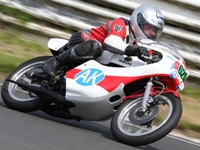You also need dummy actuators (coils / injectors replaced by resistors) to avoid error codes on the original ECU.

Have You Had An Ecu Remap ?
#102

Posted 22 February 2016 - 10:29 pm
You also need dummy actuators (coils / injectors replaced by resistors) to avoid error codes on the original ECU.
Yerp i need to look into that. i don't think the injectors are current switched or PWM modulated (like high frequency diesel multijet systems), but there must be plausibility testing.
I've seen secondhand Megasquirts sell for £100 and never thought to get one. The beauty of it is how easy it is to revert the whole setup back to standard
Ohlins, PC3, fuel cut defeat, +4deg timing, 17" front wheel.
#103

Posted 22 February 2016 - 10:40 pm
You also need dummy actuators (coils / injectors replaced by resistors) to avoid error codes on the original ECU.
Do you know if there's a cam sensor on the 900, i don't remember seeing one when i took the airbox off, but I wasn't looking for one at the time.
Do we just have the crank ignition pulser to take timing from ?
Ohlins, PC3, fuel cut defeat, +4deg timing, 17" front wheel.
#104

Posted 23 February 2016 - 01:17 am
Injectors are mainly solenoids, they are switched to the ground by a mosfet inside the ECU.
The cam sensor is located...on the cam cover (LHS seen from above the bike) refered as the "cylinder identification sensor" on the documentation.
This is a hall effect sensor, the same one as the speed sensor.
#105

Posted 23 February 2016 - 08:35 am
Injectors are mainly solenoids, they are switched to the ground by a mosfet inside the ECU.
The cam sensor is located...on the cam cover (LHS seen from above the bike) refered as the "cylinder identification sensor" on the documentation.
This is a hall effect sensor, the same one as the speed sensor.
I was aware about the injectors. The injectors on the multijet diesel I last played with were piezo devices, but worked the same.
If there's already a cam sensor that suits the Megasquirt system very well..... I don't suppose you know how many teeth are on the actuator ring ? I could try to find cams for sale on ebay and work it out from photographs. ![]()
I was thinking this morning that a couple of good quality DPST relays (one for injectors, one for coils) could be used to make the system switch selectable, at least to make the tuning in period easier ![]()
Ohlins, PC3, fuel cut defeat, +4deg timing, 17" front wheel.
#106

Posted 23 February 2016 - 06:42 pm
The 900 exhaust cam has only one "tooth"
The yellow speedo signal box was fitted when I got the bike - it's a "dip switch" type of switch
I'm really enjoying this thread, wish I understood some of it ![]()
Edited by dandywarhol, 23 February 2016 - 06:47 pm.
1967 Yamaha TD1C 250, 2014 Kawasaki W800, 2011 Aprilia Tuono 1000 V4, 2020 Yamaha XSR900
"At the cutting edge of technophobia" 

#107

Posted 23 February 2016 - 07:22 pm
I'm using the Ignitech TCIP4 on my carburetted TRX850, so the 850 bhoyos can also join in this excellent thread. Good prices too - especially with the favourable euro £ rate. http://www.ignitech.cz/en/vyrobky
Probably going to fit one to my SZR660 next
1967 Yamaha TD1C 250, 2014 Kawasaki W800, 2011 Aprilia Tuono 1000 V4, 2020 Yamaha XSR900
"At the cutting edge of technophobia" 

#108

Posted 23 February 2016 - 08:09 pm
The 900 exhaust cam has only one "tooth"
The yellow speedo signal box was fitted when I got the bike - it's a "dip switch" type of switch
I'm really enjoying this thread, wish I understood some of it
Thanks for that, a single tooth on the cam should be compatible. but if not it's easy to make a little something to fool the MS into thinking it's seeing more teeth per rev
I'll just wait for a cheap unit now
Edited by fixitsan, 23 February 2016 - 08:10 pm.
Ohlins, PC3, fuel cut defeat, +4deg timing, 17" front wheel.
#109

Posted 26 February 2016 - 11:23 am
Some related comments here ...Not wanting to dampen this discussion, but IMO the TDM is just not the machine to be worth messing and spending a fortune with ECU stuff. It is simple and with a too simple injection. Mine is now good - I gave up fiddling after fitting an EJK from Dobeck and disconnecting the O2 sensor. I used it for a while and then sent it back with some suggestions and they reprogrammed it and the bike is as good as it will get I think. It gives me enough adjustment range at each part of the curve to do whatever I want and that is as good as the bike will get without spending more than it's worth. It uses more fuel but who cares? I have determined to stop fiddling with the TDM and do that on other machines that will give me more feedback for the effort. Not knocking the TDM though; it is a brilliant touring bike for me and I love it.
#110

Posted 26 February 2016 - 04:15 pm
Ohlins, PC3, fuel cut defeat, +4deg timing, 17" front wheel.
#111

Posted 26 February 2016 - 08:35 pm
By all means play your thing. We all got our own little obsessions but please refrain from calling it a problem. It isn't.
Rob
#112

Posted 26 February 2016 - 09:28 pm
I'm not calling it a problem. i only said I feel it's a problem based on my own knowledge and experience
A couple of things which I see that could be can be improved upon are changing the crude Alpha-N fuel control to Speed Density blending scheme....and end the obsession with the oxygen, O2, sensor.
The O2 sensor does nothing during acceleration. Under hard acceleration the ECU drops into open loop control and ignores the O2 sensor output. I see a lot of posts by people saying we should disconnect the O2 sensor, but the O2 sensor is your fuel efficiency friend, one which ducks out of the way whan you want to accelerate hard.. The reason we know this is that the O2 sensor is a narrowband device...it can only be relied upon at afr's of 13.7-15.2 usually (plus or minus a bit) ...but acceleration enrichment demands that afr's down to 12.5:1 (worse case) could be used (standard figures for a lot of petrol engines)
So from my point of view - why disconnect the O2 sensor ? you don't get more power, you just get more power at smaller throttle openings, but when it comes to wide open throttle, WOT , conditions, you cannot increase peak power by very much with a Power Commander or Dobek, The Power Commander website also backs that up - they say peak power is often unchanged.
So for my money, why pay the best part of £300 for something which you can get for free, just by opening the throttle more and making the ECU do the enrichment for you ?
Power Commanders don't cause any problem for your engine, , I would never say they do, they just seem to be a 'no big wow' way to change the feel of your bike.
Regarding the Basic Alpha-N fuel maps, Alpha-N means that the ECU uses throttle position to calculate engine load. It's very crude but it does work, it works best of all on forced induction (turbo... super... charging) because on those engines you cannot use manifold vacuum as an indication of load.
But for normally aspirated engines, Alha-N is is the very poor second cousin of Speed Density control, which depends entirely on the inlet manifold pressure to derive the engine load signal. I think the TDM uses some manifold pressure signal , but mostly I would say from my experience that it runs Alpha-N control most of the time, by the way that it responds to throttle control, it's quite a jerky bike... a lot of people have said this too. If there is a problem i would put it in the area of the way speed density and alpha-n control are being blended
So as much as I enjoy it, i still think there's room for improvement. Regarding the ignition control - it is also Alpha-N based, so for the reasons I explained above, it could be improved too.
Yes I agree that these details probably aren't important to most people, but when you understand the difference they can be niggles which you feel could do with be changed , somehow, at least just to realise if the exercise is pointless or not (assuming the time exists for me to try doing that ) ![]()
Chris
Edited by fixitsan, 26 February 2016 - 09:53 pm.
Ohlins, PC3, fuel cut defeat, +4deg timing, 17" front wheel.
#113

Posted 28 February 2016 - 10:09 am
I did not mean to belittle your passion for what you do. Quite the opposite. Keep at it. I find it interesting. But nobody programs ECUs for free. Unless you offer that service once you have cracked it. And then you would have had considerable expenses yourself.
I did not mean that P/C do harm the engine I meant the ignigtion timing being out noes not. And generally I don't think we TDMers use P/Cs to increase power. Its the surging that gets to most of us, not all though.
So, carry on Chris, see how far you get.
Rob
#114

Posted 28 February 2016 - 10:35 am
I didn't take offence Rob. I understand that not everyone has the same understanding of the concepts so I tend to write more words rather than abbreviate. . You obviously do understand and I agree, what the PC does (apparently) gives some riders a better experience. But not all bikes have the problem...strange eh ? I wonder about that.
Ignition timing being out can cause engine trouble though. When running lean in fuel efficient modes the ignition is often advanced to compensate for the relatively slow burning lean mixture. If you then add a PC and reduce the afr so that it is richer, then faster combustion takes place. Pinking could occur, in theory at least, but I guess most people would turn the mixture back if they got such a problem, but then again enriching the mixture can be beneficial for the engine at other times too.
This is why tuning topics probably get discussed to death. Most people are correct most of the time, but because it is impossible to to talk about one aspect of engine tuning on it's own...they're all interconnected !
I'm just talking from my own experience. I used to set up a friends road rally Mini (when I worked in a garage and had access to the necessary equipment), and my own A-seres based cars, among others, and my experience tells me that if you adjust fuelling you had better check the timing and adjust it again if necessary to achieve highest torque. But even that is just my personal opinion, I've tuned for torque over power most of the the time. Power is only torque x rpm , so to get more power either increase torque at a particular rpm, or increase the peak rpm at which the engine can create useful torque. Timing differences of a couple of degrees can increase and decrease torque significantly. !
But like you say, PC type devices work....I used to run a similar device on my multijet diesel. But even in a diesel the ignition timing could do with being changed when you increase fueling, to achieve the most efficient gains
Ohlins, PC3, fuel cut defeat, +4deg timing, 17" front wheel.
#115

Posted 09 March 2016 - 08:51 am
Went down to Hilltop today and saw Geoff, And after spending a few hours chatting while he worked on some chaps race BMW, I decided to book the bike in for his remapping services. Needless to say he isn't impressed by Power Commanders. Considering the difference in price I'm very happy to see what he can do with the bike. So March 2nd the bike gets done. I shall inform all of the differences I experience!
Oh and price is £360 for his ECU remapping. Lol he said he'd service it as well, but if it had been a Mk 2 it could fook off!!
How did this turn out in the end ?
Ohlins, PC3, fuel cut defeat, +4deg timing, 17" front wheel.
#116

Posted 09 March 2016 - 10:05 am
How did this turn out in the end ?
Oh yes, sorry had to postpone until later sometime. Don't worry it will get done this summer.
#117

Posted 11 March 2016 - 05:51 pm
Injectors are mainly solenoids, they are switched to the ground by a mosfet inside the ECU.
The cam sensor is located...on the cam cover (LHS seen from above the bike) refered as the "cylinder identification sensor" on the documentation.
This is a hall effect sensor, the same one as the speed sensor.
Curiosity had me dig out my 'scope and check a few things.
I was looking for something to indicate the 270 degree timing requirements to the ECU, such as a non symmetrical crank position sensor output or the output from the cam sensor.
From what I can gather the ECU generates the required timing signal, based on, probably, the cam sensor.
The cam sensor output is symmetrical and runs at rpm/2 as expected.
The crank sensor output is rpmx10 . 10 equally spaced magnets on the rotor/flywheel
The cam sensor is hall effect and produces a very nice flat sided square wave, the crank sensor is a magnetic/induction type producing a near sinewave, with fast zero crossing.
The reason for checking these things is to start logging ignition timing under various load conditions, in different gears. In order to do this I need to establish the significant event which is used as the datum for firing the ignition coils. It looks to me that the best signal comes from the cam sensor, so I'll look at that first, and measure the time delay between a cam pulse and the firing of no.1 cylinder ignition coil. The time delay is a proxy for degrees of advance (one full cycle behind the actual timing event)
But. if the main timing is carried out by the cam sensor, why have 10 magnets on the flywheel/rotor ? It would make sense to read the crank position in order to react quickly to engine speed changes, or maybe counting a fixed number of crank pulses after a cam pulse gives allows for more accurate timing, because not only will you get a more refined crank angle estimate, a more up to date rpm estimate can be made by measuring the time between each 36 degree pulse.
At this stage all I'm attempting to do is capture and analyse the timing curve under various load conditions and each gear. Should it be the case that there is ignition retardation applied for reasons of ease of riding, low fuel quality compensation, noise reduction and so on, I would like to then use the data to bring the best performing advance timing curve to every gear under all load conditions, by firing the ignition coils earlier ( almost certainly the ignition should be advanced IMHO )
Ohlins, PC3, fuel cut defeat, +4deg timing, 17" front wheel.
#118

Posted 11 March 2016 - 07:20 pm
Main difference between hall effect sensors and magnetic pick-up sensors is that the first ones send a digital signal while the latters send an analog signal that require to be processed by some schmitt trigger inside the ecu - the hall-effect sensor has some embedded electronics that do the job.
All in all both types give the same result : a rotation position/speed information to the ecu.
As far as I know hall effect sensors are more expensive than simple coil sensor to produce, but they are also more robust and heat-resistant. I guess that's why they are more reliable when located on the top-engine which is the higher temperature location on an engine.
Concerning the ten notches on the crankshaft : it's better to have the rotation speed information ten times per shaft turn than only one, mainly when the engine rotation speed is rising or falling. That way the ecu is able to send the correctly calculated timing to the spark plugs and the injectors instead of sending it with one full shaft turn latter.
#119

Posted 11 March 2016 - 08:05 pm
The zero crossing point is harder to derive at higher rpm because of dv/dt increase.
But the hall output is 5.5V switching immediately to zero when actuated. I reckon it is used for timing because of the accuracy.
The crank sensor sits in oil and the cam srnsor is splashed with oil so im not sure any significant temperature differential exists.
I was just a few moments ago trying to get the relationship beteeen the two - i dont want to assume that when the cam sensor is actuated a crank pulse occurs simultaneously. But by hand cranking with the ignition on (a bit risky sometimes !) I cant generate enough field in the crank sensor. Instead I'll test and count the crank sensor pulses in software, relative to the cam output pulse. I wish i had a dual trace scope now !
Ohlins, PC3, fuel cut defeat, +4deg timing, 17" front wheel.
#120

Posted 11 March 2016 - 08:15 pm
Its amazing that I know all these words being used and it still means nothing to me!!!
1 user(s) are reading this topic
0 members, 1 guests, 0 anonymous users










